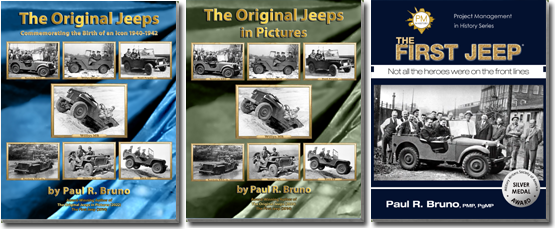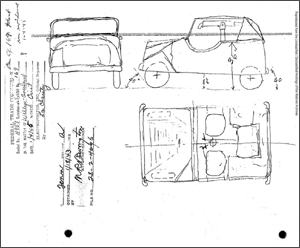- Menu
Genesis of an Icon
These Prototype Models Made History
The Bantam Reconnaissance Car (BRC) grew out of the United States Army's need for a rugged, reliable small vehicle to move troops and small payloads to replace the mule in the new era of mobility that emerged in warfare between World War I and World War II. Throughout the 1930s the United States military searched in vain for a solution and in early 1940, no vehicle existed either in design or reality, to meet the Army's requirements.
Through the efforts of Bantam's Charles Payne another attempt at procuring this vehicle emerged from the Army's Infantry branch in early June 1940. The effort gathered momentum until by the end of July of that year a bankrupt Bantam was chosen as the vendor to attempt to build a prototype vehicle to the military's specifications in the astonishing short time-frame of forty-nine days.
In what became the "miracle of the 49 days at Bantam" the intrepid individuals of that firm built and delivered the first Jeep with just a ½ hour to spare on day 49, September 23, 1940. In an immediate endorsement of their work, Major Harold Lawes, commander of Camp Holabird, the Army's primary vehicle depot in 1940, drove the vehicle immediately after its delivery and stated, "this vehicle is going to be absolutely outstanding." The United States Army had found the solution to the small vehicle problem that had vexed them for a decade.
The American Bantam Car Company won the right to attempt to build what would become the first Jeep. However, Willys-Overland Motors, Inc., a Toledo based automotive manufacturing firm, had placed second in that competition and had a keen desire to also build a prototype to the military's specification. Working with the Army's procurement branch, the Quartermaster Corps, the Army agreed to test a Willys entry if the Toledo firm built and delivered the vehicle at their own expense.
Assembling their own talented team Willys produced their version of the vehicle and delivered it to the United States Army on November 13, 1940. The Willys team made a fateful decision to use their heavier, more powerful, Go-Devil engine in their prototype which gave them an advantage in performance, but seriously hampered their efforts in the competition with Bantam and Ford due to the extra weight.
The Willys Quad would struggle to pass the Army's grueling tests. However, through grit and sheer determination, the Willys team evolved their prototype from the Quad to the Willys MA. This vehicle proved a formidable competitor to Ford and Bantam's designs and eventually proved to be the forerunner of the Willys MB, the iconic Jeep of World War II.
Ford Motor Company initially showed little interest in the United States Army's attempt to procure a rugged, reliable small vehicle to move troops and small payloads to replace the mule as the initial numbers ordered were too small to interest a firm of their size. However, as the procurement progressed, the Army's Quartermaster Corp. specifically sought out Ford in early October 1940 and requested they build a prototype of the vehicle.
Using lessons learned by the Army, Bantam and Willys, a Ford team built and delivered a prototype by November 23, 1940 and dubbed it the Pygmy. The original Pygmy remains the only one of the original three prototypes to survive. The Historic Vehicle Association (HVA) of Huntsville, AL, owns it.

The United States Army between the Wars

June 1940. German Panzers were fierce. U.S. was
still using the mule.
By June 1940, the United States ranked as the 18th most powerful military in the world one tier behind Bulgaria. Malaise at home, the Great Depression and deep recessions within it, drained of capital, the nation challenged the administration in Washington to not engage in any foreign entanglements. Nevertheless, European countries fell like paper dominoes to the relentless shattering of all that stood in front of German Panzers and the rest of their invincible Blitzkrieg. After decades of thinking about it, the U.S. Army began to develop an answer.


"...no better account of the creation of the Jeep has been written!" —Reader Review
© 2006-2025 Paul R. Bruno, Henderson, NV USA
All Rights Reserved
Publisher & Designer
MFM Publishing, L.A., CA USA
+1 310-429-9707
CONTACT THE AUTHOR
![]()
![]()
![]()
![]()
![]()
Back
to Top▲


